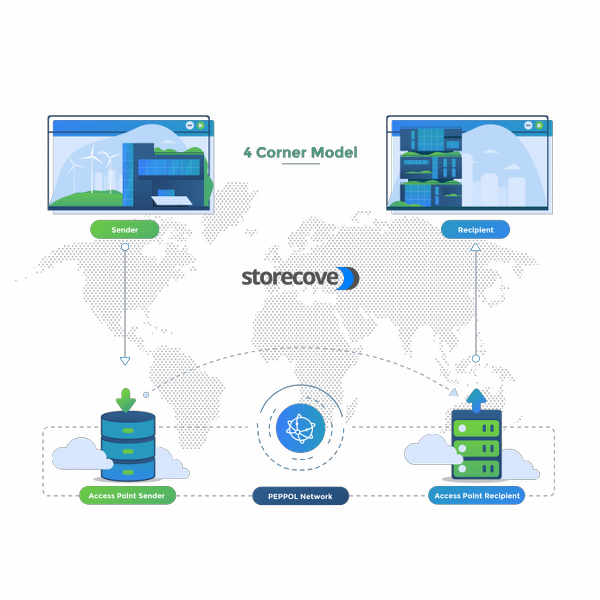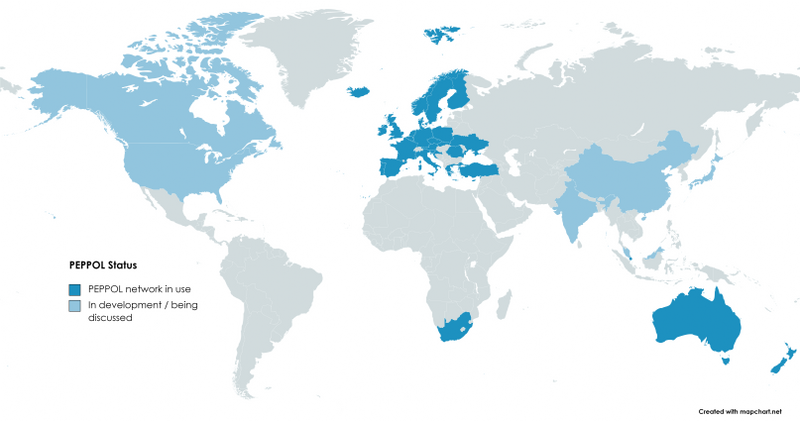Introducing PEPPOL was one of the first objectives for the E-Invoice Promotion Association (EIPA) ever since its establishment in July 2020. It aims to use PEPPOL for e-invoicing throughout Japan, which means that companies can now use e-invoicing instead of keeping books and maintaining records for taxation.
In one of its recent announcements, the EIPA gave a hint about PEPPOL analysis for Japan in June 2021. The analysis aimed to identify further requirements to align with Japanese and international standards for e-invoicing.
It's likely to take effect in October 2023, after which Japanese companies will be able to send e-invoices to local and foreign companies, which is extremely efficient, safer, and resistant to human error.
This article will dive deeper into the nearing PEPPOL adoption in Japan.
Let’s dive in!
PEPPOL in Japan overview
As EIPA identified the need for a more secure and cryptic system for E-invoicing, PEPPOL came up as an automatic choice because it’s a trusted network service for formal documentation and invoicing. It’s similar to a telephone network where you can recognize the sender immediately with a unique PEPPOL ID, making transactions of valuable electronic documents safer.
Let alone PEPPOL, EIPA itself was introduced just recently in Japan. EIPA was launched in July 2020, and it immediately called for an E-invoicing mechanism in the country.
Identifying a significant drawback in the taxation system, EIPA was adamant about introducing electronic invoices, calling upon urgent development of tools and requirements for the process.
Over the years, the Japanese taxation system primarily ran on manual bookkeeping. However, it was a laborious process, and the chances of leaking critical governmental and economic details to irrelevant personnel were high.
With the establishment of PEPPOL, EIPA also urges the government to introduce a dedicated operating system for a speedy setup of e-invoicing. In addition, EIPA is already pushing companies to start using e-invoicing for transactions to promote an electronic environment for taxation.
It also means that PEPPOL access points will play a key role in helping companies to use e-invoicing via PEPPOL. Since there are two significant players, i.e., companies and government agencies, PEPPOL service providers will also become a critical part of the setup and have a fair share in e-invoicing businesses.
Access point service providers allow clients to connect to a global network of companies that use the service for e-documents. So, as Japanese companies start shifting to PEPPOL for transactions, Storecove can be a handy option in providing flexible PEOPPOL pricing plans with several automated features while ensuring top-level safety when making transactions.

What PEPPOL e-invoicing in Japan means
PEPPOL e-invoicing means that the country will use an electronic invoicing method on the national and global levels. It promises alignment of the current Japanese standards with the PEPPOL standards. The update of standards will bring a significant digital transformation in taxation norms in the country. Companies and government organizations can bypass manual bookkeeping and shift to a digitized version of invoicing and document sharing.
The Pan-European Public Procurement OnLine (PEPPOL) is an interoperability framework that goes beyond individual applications to enable data sharing across different systems within organizations and across borders.
As PEPPOL starts its services in Japan, Japanese companies can now register for the service through a trusted access point provider like Storecove in a straightforward process.
Whether it’s for government agencies or companies, they can easily register on PEPPOL through an access point and request a unique PEPPOL ID. After that, these companies will go through a validation process and then start sending and receiving PEPPOL invoices through an utterly secure gateway.
Why did Japan recommend PEPPOL for e-invoicing?
Standardizing e-invoicing in Japan is mainly due to the efforts of the Minister of Digital Transformation, Takuya Hirai. PEPPOL aims to improve the life cycle of public procurements through better standardization, more transparency, and better accessibility.
Hirai’s decision to help develop an e-invoicing platform is significant and represents his commitment to enhancing operational efficiency and productivity. However, it is not the only decision; he also aimed to start a digital agency to streamline governmental procedures and policies.
As COVID-19 struck organizations globally, there were apparent limitations in physical invoicing as corporations practiced limited physical interaction.
Interestingly, Japan had a relatively low percentage of online practices. According to research, Japan conducted less than 12% of its administrative jobs online. For a country that prides itself in innovation, this percentage was considerably low, and it continued to work with physical documents and the exchange of papers.
Understandably, as companies couldn’t continue working with physical interactions, it resulted in lower efficiency and significant losses. Moreover, due to poor process management in many sectors, the progress slowed down, causing operational sector breakdowns.
The Digital Solution
Hirai openly admitted that Japan had been left behind in the digital era. He became keen on making changes to bring the empire back up from insignificance. Therefore, Japan launched a new agency to boost its standing in the world of digital innovation.
They eventually realized that a solution such as PEPPOL is essential to the Japanese economy as it helps establish trust and make financial connections fairer, faster, and more efficient. Furthermore, it is a means of fighting back and rebuilding its reputation as an innovative country globally.
Companies can perform better and grow beyond their local borders when the right technologies and services are in place. For instance, PEPPOL access points will make it easy for leading multinationals in Japan to operate faster, expand faster, and grow beyond expectations.
Another significant advantage of the PEPPOL service is that it saves a lot of paper. Japan is one of the leading countries for taking eco-friendly measures, but traditional invoicing involves tons of paper annually. E-invoicing will help cut it down considerably. It also means that there is less cost on labor and document processing. Eventually, the invoices reach faster, and companies can receive a quicker response too.
Read also: 5 Advantages of Using an E-invoicing Portal in 2021
PEPPOL Access Point Solutions
The invoicing regulations can vary from country to country, especially in the Asian market. As a result, it can be challenging for Asian companies and government agencies to comply with global standards, particularly in Europe and the US.
It’s therefore understandable why Asian businesses often find it difficult to penetrate the Western markets. But thanks to PEPPOL e-invoicing, it’s possible to break these barriers.
Companies can register at a PEPPOL Access Point Solution to avoid the tedious regulations and legal processes required for standardized invoicing.
For instance, if a company chooses a Peppol Access Point, it only needs to subscribe and pass validation. The formatting and everything else will be taken care of.

Next invoicing steps for businesses operating in Japan
As a business or government agency, it is vital to upgrade accordingly to stay relevant. Therefore, it’s high time to switch to an e-invoicing access point provider because it’s a long-term investment.
The first e-invoicing step is to sign up for an access point service. Of course, the security and safety of the invoices are equally essential. So, you can sign up at the website and request a unique ID. Once the ID is validated, your business can start sharing invoices with government agencies and other clients to receive payments faster and safely.
Other than using the services from Storecove, you can also become your own access point provider. It’s an opportunity within the service that lets potential access point providers connect PEPPOL customers and share invoices among themselves.
Since PEPPOL solutions are often both native and cloud-based, it’s an appealing opportunity for Japanese businesses to avail of the service. And last but not least, by connecting your business to the globally recognized e-invoice network, you allow yourself to comply with important European and Asian invoicing regulations.
More Information About PEPPOL in Japan?
Contact us for more information or request a demo with one of our e-invoicing experts.
Read also:

Comments